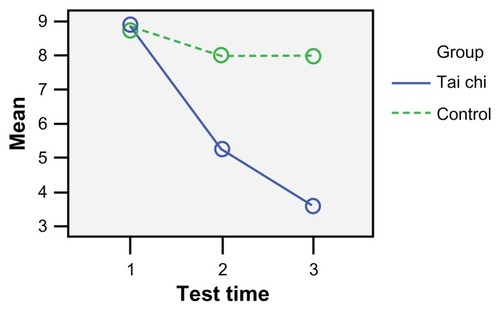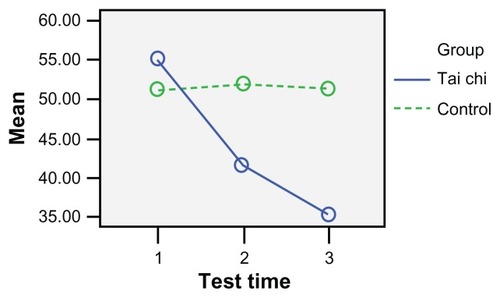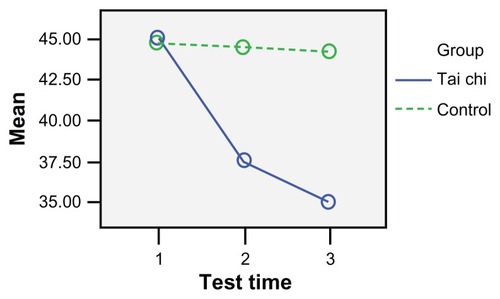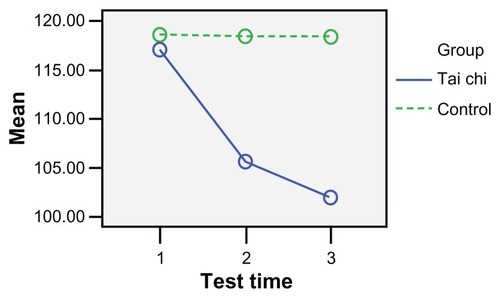Abstract
Objective
To evaluate the effects of Tai chi exercise on balance, sleep quality, and cognitive performance in community-dwelling elderly in Vinh city, Vietnam.
Design
A randomized controlled trial.
Participants
One hundred two subjects were recruited.
Intervention
Subjects were divided randomly into two groups. The Tai chi group was assigned 6 months’ Tai chi training. The control group was instructed to maintain their routine daily activities.
Outcome measures
The Falls Efficacy Scale (FES), Pittsburgh Sleep Quality Index (PSQI), and Trail Making Test (TMT) were used as primary outcome measures.
Results
Participants in the Tai chi group reported significant improvement in TMT (part A) (F [1, 71] = 78.37, P < 0.001) and in TMT (part B), (F [1, 71] = 175.00, P < 0.001) in comparison with the control group. Tai chi participants also reported better scores in FES (F [1, 71] = 96.90, P < 0.001) and in PSQI (F [1,71] = 43.69, P = 0.001) than the control group.
Conclusion
Tai chi is beneficial to improve balance, sleep quality, and cognitive performance of the elderly.
Introduction
Muscle weakness, impaired gait, and diminished balance are the most significant risk factors for falling.Citation1 It has been documented that physical activities are based on balance ability; when the perturbation increases and leads to an unstable balance state of the trunk, a fall is more likely. Balance is the ability to maintain the body’s position over its base of support, whether that base is stationary or moving.Citation2 Previous studies, on the other hand, have shown that poor sleep in older people is related to impaired health status, low levels in physical activities, poor physical functioning, and an increase in chronic diseases.Citation3,Citation4 Moreover, a review of Angevaren et alCitation5 concluded that aerobic physical activities that improve cardiorespiratory fitness are beneficial for cognitive function in healthy older adults, with effects observed for motor function, cognitive speed, and auditory and visual attention. However, the majority of comparisons yielded no significant results.
Tai chi consists of series of gentle physical activities with element and meditation, body awareness, imagery, and attention to breathing.Citation6 Furthermore, Tai chi is a low- intensity exercise that provides aerobic benefitCitation7 and is effective for improving fitness.Citation8 Tai chi also appears to have physiological and psychological benefits, and to be safe and effective in promoting balance control, flexibility, and cardiovascular fitness.Citation9 To our knowledge, there have been few studies on effects of Tai chi on sleep quality, cognitive performance, and balance of community-dwelling older people. Thus, it would be worthwhile to carry out a study on the aforementioned issues.
Materials and methodology
Participants
Ninety-six community-dwelling participants were recruited at age 60–79 years (68.9 ± 5.1) from Vinh city to undertake a Tai chi program. Six subjects (6.2%) dropped out within 3 months (first phase). Seventeen subjects (17.7%) dropped out during the next 3 months. The 6-month Tai chi training included pre- and post-training and follow-up (follow-up used only for Tai chi group). Inclusion criteria of both groups included the subjects being able to finish the Mini Mental State Examination (MMSE) with a score greater than 25 and having no experience in Tai chi. Exclusion criteria included subjects with serious diseases, such as symptomatic coronary insufficiency, angina, arrhythmia, orthostatic hypotension, and dementia.
Intervention
In a randomized, controlled trial, 102 subjects were recruited. Six subjects did not meet the exclusion criteria (Mini Mental State Examination score ≥ 25). Subjects were divided randomly into two groups – Tai chi group and control group. The subjects were expected to consent and volunteer. Participants in the Tai chi group (n = 48, mean age = 69.2 years, standard deviation = 5.3) were assigned 6 months’ Tai chi training. Participants in the control group (n = 48, mean age = 68.7, standard deviation = 4.9) were instructed to maintain their routine daily activities and not to begin any new exercise programs. Statistical analysis was based on previous findings,Citation10,Citation11 using the standardized mean difference of the group means, alpha level = 0.05, desired statistical power = 0.8, and effect size set at medium (0.5). Experienced Tai chi instructors were selected by investigators to teach classes. The version of Tai chi followed was the 24-form style, which incorporates elements of balance, postural alignment, and concentration.
Participants in the Tai chi group attended a 60-minute Tai chi practice session twice a week for 6 months. The session consisted of a 15-minute warm-up and a 15-minute cool- down period. Participants in the control group were instructed to maintain their routine daily activities.
Main outcome measures
The Falls Efficacy Scale (FES), an instrument to measure fear of falling, was designed to assess the degree of perceived efficacy at avoiding falls during each of ten relatively nonhazardous activities of daily living (as previously described by Tinetti et alCitation12).
The Pittsburgh Sleep Quality Index (PSQI) is an effective instrument used to measure the quality and patterns of sleep of older adults (as previously described in Buysse et alCitation13).
The Trail Making Test (TMT) is primarily a test of motor speed and visual attention. In TMT part A, the subject’s task is to quickly draw the lines on a page connecting 25 consecutive numbers. In part B, the subjects must draw the lines alternating between number and letter. Both parts of the TMT consist of 25 circles distributed over a sheet of paper (as described in Corrigan and Hinkeldey,Citation14 Gaudino et al,Citation15 and ReitanCitation16).
Statistical analyses
Analysis of variance was used to analyze the difference- dependent variables of tests. General linear repeated measures were used to identify interaction between types of intervention and test time and within-subject main effect. A value of P < 0.05 was considered to be statistically significant.
Results
Descriptive characteristics of the samples in both the Tai chi and control groups are shown in : the age range (year), average age value (year), body mass index range (kg/m2), waist–hip ratio range (cm), marital status (number, percentage), and years of education.
Table 1 Characteristics of the study sample
Comparison of sleep quality, balance, and cognitive performance between Tai chi and control groups at baseline
Results () show that there were no significant differences in independent variables between the Tai chi and control groups at baseline.
Table 2 One-way ANOVA between Tai chi and control groups at baseline
Comparison of sleep quality, balance, and cognitive performance between Tai chi and control groups at end test
Results () show that there were significant differences in independent variables between the Tai chi and control groups at end test. Results from PSQI indicated sleep quality between the two groups, with F (1, 71) = 43.69, P < 0.001; cognitive performance can be observed from TMT part A, with F (1, 71) = 78.37, P < 0.001; TMT part B, with F (1, 71) = 175.90, P < 0.001; and balance ability in FES, with F (1, 71) = 96.90, P < 0.001.
Table 3 One-way ANOVA between Tai chi and control groups at end test
Comparison of results from three periods of tests between Tai chi and control groups
There were significant interactions in sleep quality, balance, and cognitive performance between the two groups and test times. This can be observed from the results shown in (P < 0.001), and also from the four figures that illustrate the estimated means of PSQI (), FES (), TMT part A (), and TMT part B () between the Tai chi and control groups over the test times. The Tai chi group showed better results than the control group for all variables.
Table 4 General linear model-repeated measures of variables
Discussion
In this study, we examined the effects of 24-form Tai chi exercise during 6 months on sleep quality, balance, and cognitive performance of older community-dwelling people. On the basis of this study, it may be concluded that 24-week Tai chi training has a positive effect on sleep quality, balance, and cognitive performance of the community-dwelling elderly in Vietnam. The main findings of this study were that older adults benefited from Tai chi exercise for sleep quality (better scores in PSQI), whereas no improvement was observed for the control group. Results of balance tests and cognitive performance tests also strongly proved that Tai chi could improve the balance ability and cognitive executive function in comparison with subjects’ counterparts in the control group.
It has been documented in previous studies that Tai chi could have better scores in the sit-and-reach test, total body rotation,Citation17 and reduction in falls,Citation18 which shows that a 12-week Tai chi exercise program can safely improve physical strength and blood pressure and reduce fall-prone older adults in residential care facilities.Citation19,Citation20 The results of our study are consistent with studies that have stated that Tai chi can improve the balance ability of older peopleCitation21–Citation23 and sleep quality,Citation24 and we conclude that through a 6-month Tai chi program, participants with moderate sleep complaints can be improved in self-rated sleep quality. A previous findingCitation25 also suggested that after a 10-week tai chi program in older adults using a pre- to post-test design, cognitive executive function was improved. Tai chi is a traditional Chinese aerobic exercise. Its benefits are improvement in balance, flexibility, muscle strength, neuromuscular reaction, and endurance in elderly individuals.Citation26–Citation28 Tai chi has also been suggested as a useful nonpharmacological approach to sleep problems in older adults,Citation24 and this is a low-technology exercise that can be easily carried out in a variety of communities. Furthermore, Tai chi is a low-cost exercise,Citation11 and it can be practiced indoor or outdoor.
Over the 6-month Tai chi program, we had an 18.75% drop-out rate in the Tai chi group. This is evidence that a relatively high proportion of participants were likely to engage in Tai chi training. The attrition in participation was due mainly to traveling or leaving the city rather than dissatisfaction with the training program.
Conclusion
In this 24-week randomized controlled trial study, Tai chi is beneficial to improve sleep quality, balance, and cognitive performance of community-dwelling older people.
Further study
This study focused on a healthy group of older community-dwelling adults living in Vietnam. Other populations should be observed, the frail, for instance. The effects of Tai chi for people with osteoporosis, Parkinson’s, arthritis and other chronic diseases have been documented elsewhere. However, empirical and controlled trial studies should be carried out widely. In future, Tai chi programs should be compared to other sport or recreational activity programs to see less biased effects.
Acknowledgments
This work was supported by grant no 3612/QD-BGDDT from the Vietnam International Education Development; travel grant from Graduiertenakademie Universität Heidelberg/ Heidelberg University Graduate Academy, Institute of Gerontology, Heidelberg University, Germany; and Tai chi club in Vinh city, Vietnam.
Disclosure
There are no conflicts of interest in this work. The study sponsors played no role in the study design, collection and analysis of data, writing of the manuscript, or decision to submit the manuscript for publication.
References
- DaleyMJSpinksWLExercise, mobility and agingSports Med200029111210688279
- SpirdusoWWPhysical Dimensions of AgingChampaignHuman Kinetics1995
- GooneratneNWeaverTCaterJFunctional outcomes of excessive daytime sleepiness in older adultsJ Am Geriatr Soc2003515462469
- NewmanASpiekermanCEnrightPDaytime sleepiness predicts mortality and cardiovascular disease in older adultsJ Am Geriatr Soc200048211512310682939
- AngevarenMAufdemkampeGVerhaarHAlemanAVanheesLPhysical activity and enhanced fitness to improve cognitive function in older people without known cognitive impairmentCochrane Database Syst Rev20082CD00538118425918
- YehGYCommentary on the Cochrane review of Tai Chi for rheumatoid arthritisExplore (NY)20084427527718602623
- LiFZHarmerPMcAuleyEFisherKJDuncanTEDuncanSCTai Chi, self-efficacy, and physical function in the elderlyPrev Sci20012422923911833926
- LanCLaiJSChenSYWongMK12-month Tai Chi training in the elderly: its effect on health fitnessMed Sci Sports Exerc19983033453519526879
- WangCColletJPLauJThe effect of Tai Chi on health outcomes in patients with chronic conditions: a systematic reviewArch Intern Med2004164549350115006825
- LiFZDuncanTEMcAuleyEHarmerPDelineating the impact of Tai Chi training on physical function among elderly: modeling the moderating effects of unobserved class trajectoriesAm J Prev Med200223929712133743
- LiFZHarmerPMcAuleyEAn evaluation of the effects of Tai Chi exercise on physical function among older persons: a randomized contolled trialAnn Behav Med200123213914611394556
- TinettiMERichmanDPowellLFalls Efficacy as a measure of fear of fallingJ Gerontol1990456239243
- BuysseDJReynoldsCFMonkTHBermanSRKupferDJThe Pittsburgh Sleep Quality Index (PSQI): a new instrument for psychiatric research and practicePsychiatry Res1989281932132748771
- CorriganJDHinkeldeyMSRelationships between parts A and B of the Trail Making TestJ Clin Psychol19873444024093611374
- GaudinoEAGeislerMWSquiresNKConstruct validity in the Trail Making Test: what makes part B harder?J Clin Exp Neuropsychol19951745295357593473
- ReitanRMValidity of the trail making test as an indicator of organic brain damagePercept Mot Skills19588271276
- HongYLiJXRobinsonPDBalance control, flexibility, and cardio-respiratory fitness among older Tai Chi practitionersBr J Sports Med2000341293410690447
- ChoiJHMoonJSSongREffects of Sun-style Tai Chi exercise on physical fitness and fall prevention in fall-prone older adultsJ Adv Nurs200551215015715963186
- KoGTTsangPCChanHCA 10-week Tai-Chi program improved the blood pressure, lipid profile and SF-36 scores in Hong Kong Chinese womenMed Sci Monit2006125CR19619916641875
- TsaiJCWangWHChanPThe beneficial effects of Tai Chi Chuan on blood pressure and lipid profile and anxiety status in a randomized controlled trialJ Altern Complem Med200395747754
- HainTCFullerLWeil KotsiasJThe effects of Tai chi on balanceArch Otolaryngo19991251111911195
- HackneyMEEarhartGMTai Chi improves balance and mobility in people with Parkinson diseaseGait Posture200828345646018378456
- FongSMNgGYThe effects on sensorimotor performance and balance with Tai Chi trainingArch Phys Med Rehabil2006871828716401443
- LiFZFisherKJHarmerPIrbeDTearseRGWeimerCTai chi and self-rated quality of sleep and daytime sleepiness in older adults: a randomized controlled trialJ Am Geriatr Soc200452689290015161452
- MatthewsMMWilliamsHGCan Tai chi enhance cognitive vitality? A preliminary study of cognitive executive control in older adults after A Tai chi interventionJ S C Med Assoc2008104825525719326614
- LanCLaiJSChenSYWongMKTai Chi Chuan to improve muscular strength and endurance in elderly individuals: a pilot studyArch Phys Med Rehabil200081560460710807099
- TaylorAHCableNTFaulknerGHillsdonMNariciMVan Der BijAKPhysical activity and older adults: a review of health benefits and the effectiveness of interventionsJ Sports Sci200422870372515370483
- XuDQLiJXHongYLEffect of regular Tai Chi and jogging exercise on neuromuscular reaction in older peopleAge Ageing200534543944415919758



